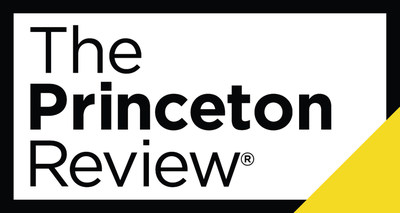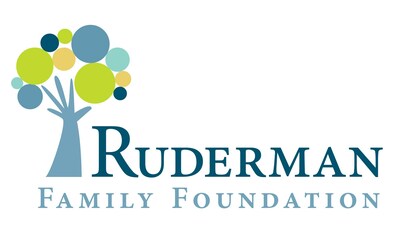The Princeton Review's 2nd Annual Campus Mental Health Services Survey Finds Double-Digit Gains in College Counseling and Wellness Programs
- Conducted in partnership with the Ruderman Family Foundation, the 2025 survey reveals significant national gains in campus counseling, wellness, and student-support programs over the 2024 survey findings
- 30 institutions named to the project's Mental Health Services Honor Roll for 2026
NEW YORK, Nov. 18, 2025 /PRNewswire/ -- Results from The Princeton Review®'s second annual Campus Mental Health Survey—a project the education services company conducts in partnership with the Ruderman Family Foundation—reveal double-digit national gains in campus counseling, wellness, and student-support programs, with 61% of colleges now offering formal support programs for students returning from mental-health leave, up 18% from last year.
The findings, drawn from surveys in 2024–2025 of administrators at 540 institutions (more than double last year's participation) and more than 31,000 students across 300 colleges, show broad-based progress in campus support for student mental health and well-being.
Additional findings of the 2024-2025 survey reveal:
- 76% of colleges have accredited or standards-aligned counseling centers — Up 15% from 61% in 2023–2024.
- 64% of colleges now operate fully staffed counseling centers year-round — Up 8% from 56% in 2023–2024.
- 93% of colleges integrate mental health and wellness into residential life — Up 14% from 79% in 2023–2024.
The Princeton Review 2025 Campus Mental Health Survey Report—which features an executive summary, survey questions, answer choices, and findings—posted today here.
The project—now in its second year and recently extended through 2028—surveys both college administrators and students to evaluate campus mental health services and awareness.
In addition to the surveys, the project has two components designed to provide college applicants with information about campus mental health resources at specific schools. An annual Mental Health Services Honor Roll recognizes schools that have shown a strong commitment to their students' mental health and well-being. The project Honor Roll for 2026 names 30 schools (listed below) to this distinction—up from 16 schools last year.
The Princeton Review also publishes information about campus mental health services and resources in its school profiles on PrincetonReview.com as well as in its annual Best Colleges guidebook. The company now includes such information in its profiles of 540 institutions: a list of the reporting schools is posted here.
"We are proud to see measurable progress in how colleges are responding to the mental health needs of students," said Jay Ruderman, President of the Ruderman Family Foundation. "This initiative is a natural extension of our work to expand access to mental health support and inclusion within higher education. Partnering with The Princeton Review allows us to highlight institutions leading the way and ensure that mental health remains a visible and lasting priority on every campus."
Said Rob Franek, The Princeton Review's Editor-in-Chief, "We are honored to partner with the Ruderman Family Foundation on this vitally important project. The Foundation has a compelling record of advancing mental health programs and services to help people of all kinds facing adversity. We are especially appreciative for the Foundation's commitment to advancing mental health and wellbeing services for college students. With our history of helping millions of students apply to and gain admission to colleges each year, we are keenly aware of the struggles many students face in college, from high stress and anxiety issues to social and academic challenges. We hope our project can increase the services for students in need and raise awareness and support for the colleges and health professionals so dedicated to these programs."
The Princeton Review has conducted this multifaceted project since October 2023 in partnership with the Ruderman Family Foundation, an internationally recognized organization that works to end the stigma associated with mental health and to promote mental health resources and student awareness of them on college campuses.
Additional Findings of the Administrator Survey
The 2024–2025 survey was sent to administrators at nearly 2,000 institutions as part of The Princeton Review's annual data collection cycle: 56 questions related to this project were added to the main survey. Among administrators responding to this year's survey:
- 99% reported their colleges have a comprehensive wellness program for all students — Up 7% from 92% in 2023–2024.
- 96% reported their colleges have a mental health services website — Up 9% from 87% in 2023–2024.
Selected Findings of the College Student Survey
On The Princeton Review's undergraduate student survey which asks students to rate and report on their experiences at their campus on dozens of topics (using a five-point Likert scale answer choice), four questions were included on the main survey for this project. The 2024–2025 survey findings reflect opinions of students from 300 colleges that completed the full survey. Their responses overall show a year-over-year increase over the responses of students from the 2023–2024 survey for every question:
- 79% agreed with the statement "If I needed to seek professional help for my mental or emotional health, I would know where to access my school's resources" — Up 1% from 78% in 2023.
- 76% agreed with the statement "Mental health services are readily available on campus" — Up 5% from 71% in 2023–2024.
- 75% agreed with the statement "I am aware of mental health outreach efforts by my school" — Up 4% from 71% in 2023–2024.
- 66% agreed with the statement "My college prioritizes students' mental health" — Up 5% from 61% in 2023–2024.
The Princeton Review's Rob Franek also noted a related finding from the company's 2025 College Hopes & Worries Survey of college applicants and parents of applicants. Asked whether having information about a college's health, wellness, and mental health services would contribute to their decision to apply to (and/or attend) a school, 81% of the survey's 9,317 respondents said such information would affect their decision. Of that cohort, 42% said they would be "strongly" or "very" interested in having such information.
The 2026 Mental Health Services Honor Roll Schools
Institutions chosen for the Honor Roll are those that have displayed an exceptional commitment to their students' mental health and well-being. The selection criteria was set by the project's Campus Mental Health Advisory Board. The 30 schools selected for the 2026 Honor Roll are listed below in alphabetical order.
Arizona State University (Tempe, AZ)
Boston University (Boston, MA)
Coastal Carolina University (Conway, SC)
Colorado State University (Fort Collins, CO)
Columbia University (New York, NY)
Dartmouth College (Hanover, NH)
Florida Institute of Technology (Melbourne, FL)
Massachusetts Institute of Technology (Cambridge, MA)
Mercer University (Macon, GA)
Michigan Technological University (Houghton, MI)
Molloy University (Rockville Centre, NY)
Nazareth College (Rochester, NY)
New York University (New York, NY)
Northern Michigan University (Marquette, MI)
Pace University (New York, NY)
Princeton University (Princeton, NJ)
Rice University (Houston, TX)
Samford University (Birmingham, AL)
St. John's University (NY) (Queens, NY)
State University of New York - Stony Brook University (Stony Brook, NY)
State University of New York - University at Albany (Albany, NY)
Stevens Institute of Technology (Hoboken, NJ)
Syracuse University (Syracuse, NY)
Texas Christian University (Fort Worth, TX)
University of Florida (Gainesville, FL)
University of North Carolina at Greensboro (Greensboro, NC)
University of North Dakota (Grand Forks, ND)
Weber State University (Ogden, UT)
William & Mary (Williamsburg, VA)
Worcester Polytechnic Institute (Worcester, MA)
The Princeton Review has posted on its website Campus Mental Health Services hub an infographic illustrating findings of the administrator and student surveys, as well as articles on mental health resources including one titled "Seven Need-to-Know National Organizations for Mental Health Awareness."
About The Princeton Review
The Princeton Review is a leading tutoring, test prep, and college admissions services company. Every year, it helps millions of college- and graduate school–bound students as well as working professionals achieve their education and career goals through its many education services and products. These include online and in-person courses delivered by a network of more than 4,000 teachers and tutors; online resources; a line of more than 150 print and digital books published by Penguin Random House; and dozens of categories of school rankings. Founded in 1981, the company is now in its 44th year. The company's Tutor.com brand, now in its 25th year, is one of the largest online tutoring services in the U.S. It comprises a community of thousands of tutors who have delivered more than 28 million tutoring sessions. The Princeton Review, headquartered in New York, NY, is not affiliated with Princeton University. For more information, visit PrincetonReview.com. Follow the company on Instagram (@theprincetonreview), LinkedIn (the-princeton-review), YouTube (@ThePrincetonReview), and TikTok (@princeton.review).
About the Ruderman Family Foundation
The Ruderman Family Foundation is an internationally recognized organization working to end the stigma surrounding mental health. By identifying gaps in resources, supporting innovative programs, and forging partnerships, the Foundation is reshaping how communities nationwide understand and prioritize mental health. From empowering educators and students, to collaborating with leaders in entertainment, sports, and gaming to foster connection and resilience, the Foundation's work spans multiple arenas. Together, these efforts are turning awareness into action and making mental well-being a visible, mainstream part of society. For more information, visit www.rudermanfoundation.org.
WEBSITE: www.princetonreview.com
![]() View original content to download multimedia:https://www.prnewswire.com/news-releases/the-princeton-reviews-2nd-annual-campus-mental-health-services-survey-finds-double-digit-gains-in-college-counseling-and-wellness-programs-302617816.html
View original content to download multimedia:https://www.prnewswire.com/news-releases/the-princeton-reviews-2nd-annual-campus-mental-health-services-survey-finds-double-digit-gains-in-college-counseling-and-wellness-programs-302617816.html
SOURCE The Princeton Review



